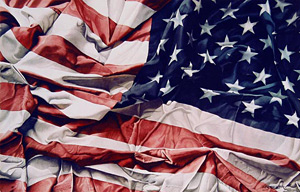 |
 |
 |
 Editorials | June 2006 Editorials | June 2006  
America's Fading Glow
 John Brown - TomPaine.com John Brown - TomPaine.com


| | Today's American soft power - our ability to influence others overseas through who we are and what we do - is shrinking, as poll after poll shows. |
"Power," Harvard Professor Joseph Nye, Jr. tells us "is the ability to alter the behavior of others to get what you want. There are basically three ways to do that: coercion (sticks), payments (carrots), and attraction (soft power)." Today's American soft power - our ability to influence others overseas through who we are and what we do - is shrinking, as poll after poll shows. This loss of soft power reduces America's ability to shape global developments in ways favorable to the national interest. What can be done about this?

There are several reasons for the decline of America's soft power. The most immediate is President George W. Bush's aggressive foreign policy. Since our internationally condemned attack on Iraq, our country is seen as the illegitimate sheriff that shoots first and asks questions later. Contrast this to the worldwide sympathy for the U.S. immediately after 9/11, when we were considered the attacked, not the attacker. Due to our unilateralism, we have lost the respect-to be sure, never universal-that we earned as a world leader resisting the totalitarianisms of the twentieth century.

Second to the aggression is the hypocrisy of Bush's rhetoric. The president proclaims the pursuit of human freedom as his foremost goal while we are becoming a parody of the Statue of Liberty, covered in prison torture garb from Abu Ghraib, obsessed with our own security but with nothing liberating (or even stabilizing) to offer to the rest of the world. Forget the "democratization" programs (also called "transformational" ) hyped by Condoleezza Rice's State Department. For much of the world, the reality is that we prop up dictators in Libya and Kazakhstan so long as they give us what we want. And, while claiming that America cares about humanity, Bush disregards transnational issues such as the global environment and supports visa regulations that offend foreigners who wish to visit or study in the United States.

A third reason for our loss of soft power is that, with over six years of Bush's "we're just plain folks" rule, our cultural exports increasingly fail to seduce overseas. To be sure, the best purveyors of American consciousness abroad don't necessarily reflect the views of the U.S. government. Yet, judging by the barometer of pop culture, American style is no longer as "cool" as it was, despite the international success of some Hollywood blockbusters. Culturally, we are more and more perceived as the old New World. "[T]he American brand isn't at its shiniest," U-2's Bono recently stated. "The neon is crackling."

Meanwhile, other countries-notably China-are filling the vacuum created by America's disappearing soft power with information and exchange programs. And popular culture from other countries-films made in India's Bollywood, manga comics from Japan -is providing an alternative to America's pop dominance around the world.

Our loss of soft power is already having negative economic consequences, and our ability to influence events through our policies-now so discredited-is increasingly limited. As a former Reagan administration official mugged by Bush reality, Doug Bandow, puts it in his "A Foreign Policy of Fools," "Every day, America is more active in the world. At the same time, it is ever more alone."

In its second term, the Bush administration seems at last to realize America has an "image problem." Typically, last week the president "admitted" that asking insurgents in Iraq to "bring it on" had been "misunderstood." Not that any of his policies had been incorrect, or that it had been a stupid thing to say, but that it hadn't been understood correctly. (One wonders how he pictures it should have been understood-perhaps by them bringing it on slightly less?)

A Bush politico, Karen Hughes, was chosen last year by the White House as under secretary of state for public diplomacy. Her goal is to make the world view the United States positively. But all indications are that ex-TV reporter Hughes-who knows little about the Middle East-has been unable to craft a public diplomacy strategy that is any more successful than the ineffective "marketing" focus of her predecessor, Charlotte Beers.

More than 30 reports have been written in recent years about how to improve America's public diplomacy. Many of their recommendations are laundry lists of recycled Cold War programs and they fail to emphasize, with rare exceptions, three crucial ways to regain America's soft power.

First, the U.S. must drastically modify its foreign policy from top to bottom so that it is more in tune with the aspirations of the rest of the world. The underpinning of Bush's foreign policy-the so-called "war on terror"-must be abandoned, and its macabre manifestations, such as the Guantanamo detainee facility, should be terminated.

Second, given the difficulty of achieving the first goal under present leadership, Americans must show other nations that we no longer tolerate Bush's travesties, either at home or abroad. If we say "no" to Bush loud and clear through our votes and grass roots protests, it will be a significant step in hearing from abroad that "America, we are with you once again."

Finally- and this regrettably will also have to wait for a new administration with a vision of life that goes beyond the provincial and evangelical-our public diplomacy must be rejuvenated with ground-breaking cultural and educational programs that show the United States in all its infinite artistic and creative variety.

With these kinds of changes, the rest of the world will know that we intend to renew our membership in the family of humanity.

John Brown, a former Foreign Service officer who practiced public diplomacy for over twenty years, now compiles the "Public Diplomacy Press Review." | 
 | |
 |



